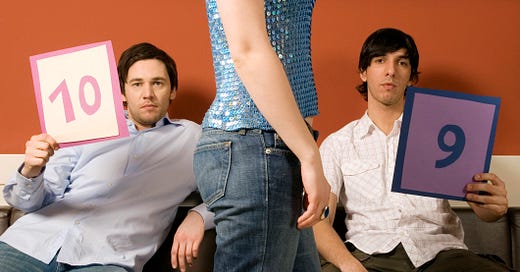I watched a TikTok recently that I can’t get out of my head. A woman holding a baby looks at the camera as Billie Eilish’s ‘Bored’ plays in the background. While Eilish sings about “giving you all you want and more,” words flash across the screen—things this woman’s partner said to her after she gave birth.
Come on, I can’t wait for you to heal from the baby. Please I’ll be careful. You can take care of me though, right? The woman winces as the last sentence plays in front of her: Let him cry, I’m almost done.
In the comment section, other mothers shared their experiences. One says waiting to have sex “was legit not given an option, he refused to wait [and] tore stitches.” Another writes, “my ex-husband waited until I was asleep and did it two weeks after I gave birth. I had 17 stitches.”
One man told his wife it couldn’t possibly hurt because a “you just had a baby way bigger come out, this is nothing.” Another woman says, “He told me to stop crying from pain because I was making him feel bad and he wanted to finish.”
I don’t know how we’re supposed to see comments like these—reading about abuses that are horrific but common—and not hate men. I really don’t. Because despite the refrain that it’s not all men, it sure does feel like a whole fucking lot of them.
This mother’s video is part of a larger TikTok trend where women are sharing videos about various kinds of abuse, pressure, or objectification—all using Eilish’s song and quotes from the men in their lives. One young woman, for example, complains about boys hounding her about her body and asking for nude photos. Another reveals being pressured for sex (“You don’t even have to do anything, just lay there.”)
We didn’t need a spate of TikToks to tell us that sexual violence and coercion are pervasive; but there’s something striking about seeing face after face looking blankly or pained at the camera while sharing the things men have said to them.
Every time I see another face, another young woman showing how beaten down or shamed she feels, I can feel my disdain growing. Not just because women are expected to live with all of this violence, subjugation and harassment—but because we’re expected to still like men despite it all.
Any complaint of abuse that isn’t prefaced with a ‘not all men’ caveat means being accused of hating men, or unfairly painting them with a broad brush. As if protecting men’s feelings is more important than speaking the truth about our lives.
It’s the ultimate in misogynist gaslighting: Convincing women that the real abuse is not liking our abusers. ‘Not all men’ is just another way of pretending that misogyny is an individual problem rather than a systemic one. Sexism has never been about a few bad apples, but a rotten barrel.
Now, I get (truly!) why anti-sexist men might feel defensive or uncomfortable when faced with women’s anger over misogyny. It must be difficult to listen to and internalize. But men: Women talking about their experiences didn’t put that pit in the bottom of your stomach—other men did. Direct your ire at those who make women afraid and resentful, the ones giving you a bad name.
Because it’s not enough to simply not be sexist or abusive. At best, that’s the bare minimum. At worst, it’s apathy. Not hurting women is still doing nothing about the men who do.
At the end of the day, I don’t want to feel resentful or angry towards men—I really don’t. It’s exhausting. But the alternative—making peace with misogyny or numbing ourselves to it—is unthinkable.
Besides, the truth is that men will be fine if we don’t like them. When women hate men, we hurt their feelings. When men hate women, they kill us.
If you like this column, consider becoming a paid subscriber! You’ll get even more pieces like this, the ability to comment and have access to a pretty great community of feminists. :)





When I read about “Karens,” a demographic that I sadly belong to, I don’t become offended. Why? Because I endeavor not to act a fool in public. I don’t own the woman’s behavior and internalize it as my own. I don’t need anymore to say to me, “not all middle-aged white women”. This begs the question, if you’re not a man who has raped (and that’s what this is folks), then why do you need the qualifier?
I understand that we’ve all done things we’re not proud of; we’ve all objectified people, lost our shit when we shouldn’t have, etc. But when I demand that someone soothe my anxiety by saying, “not all…”, then I’ve now turned the focus on me and not the problem.
Amen sister. Beautifully expressed. “‘Not all men’ is just another way of pretending that misogyny is an individual problem rather than a systemic one.”